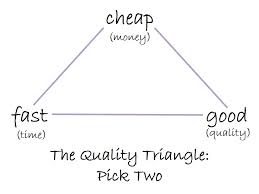I’m writing this article about my experiences in the business services industry to help both the provider and the buyer, to help in understanding prices. I’m not going to talk a lot about retail products, because consumers are well aware that sticker prices are what they are and sometimes, you get a sale. There are certainly not many people I see trying to negotiate the price of their groceries, clothing, or menu items at a restaurant, but you’ll see negotiations for furniture, housing, cars. I want to focus more on service providers for the purpose of this article.
 Now, why should you be understanding of prices? Many reasons. Negotiating can often cause stress, and be an uncomfortable experience. Not everyone loves the art of negotiation. I do, but I don’t negotiate other providers on their prices because they’re the experts in their field, not me. Here at Shine Consulting, we price most things at a flat rate so the budget is the budget. I’ve worked with consulting and software companies where everything was billed hourly. I prefer flat rate because I can’t always predict the time all of the efforts will take. I know what benefits we’re offering, and what it’s actually worth. Most hourly rates are based on benefit and value as well. It’s not unreasonable for consultants and developers of various industries and skill types to be in the $50 – $250 an hour range.
Now, why should you be understanding of prices? Many reasons. Negotiating can often cause stress, and be an uncomfortable experience. Not everyone loves the art of negotiation. I do, but I don’t negotiate other providers on their prices because they’re the experts in their field, not me. Here at Shine Consulting, we price most things at a flat rate so the budget is the budget. I’ve worked with consulting and software companies where everything was billed hourly. I prefer flat rate because I can’t always predict the time all of the efforts will take. I know what benefits we’re offering, and what it’s actually worth. Most hourly rates are based on benefit and value as well. It’s not unreasonable for consultants and developers of various industries and skill types to be in the $50 – $250 an hour range.
I’ve seen a lot of budget challenges when billing hourly and although it’s worth it to both parties, I find the flat rate to be better. It insulates our clients because they know exactly what they’re spending and exactly what they’re getting. It benefits us because we know what we’re doing, know we can’t blow the budget, and we’re incentivized to do it faster, while still delivering what we said we would. Understanding prices require you to understand that benefits and value are exactly that. Valuable. It’s worth it. Why do mechanics get to charge $75 an hour? Why do electricians and plumbers charge $100 an hour? Why do lawyers charge $250 an hour? Because they’re worth it. It’s things you can’t do as expertly yourself. They’re things that benefit you. They’re things that provide value. Knowing that people charge you what they are worth because of their experience, and ability to do it right is part of understanding prices.

I don’t hate negotiating, I’m good at it, but I prefer debating much more. I’m good at understanding prices, so I have a good idea of when I’m being gouged or significantly overcharged. If I know that a reroof on my house is about $5,000 (based on multiple inputs) and when someone goes to charge me $9,000, I’m going to inquire why. You get what you pay for but there are some that will try and get away with overcharging you. There’s a good chance this $9,000 job comes with significantly more benefit and value. Maybe a custom coating to make the premium shingles maintain their color longer, and have more stability in high winds. The coating provides waterproofing for 10 years, ensuring zero leaks with a $200,000 guarantee. That might just be worth it, right? But if that same $9,000 is for the same thing as the $5,000 quotes, why would I bother to consider it further? Now, in understanding prices, you have to understand that margins have to be made. I wouldn’t negotiate that $9,000 quote because they were offering me that value and the added benefits. Unless a price seems much too high or low for what you’re shopping for, there’s not much reason to discuss the pricing itself.

I think there are a lot of clients that really enjoy negotiating. I’ll admit it’s fun and exhilarating to tip the scales in your favor. Part of the problem is that there aren’t always margins that can be squeezed. What we offer is truly valuable and beneficial to your business and its worth what we charge. We’ve found in our case studies with clients that it’s worth a lot more, in the long run. The issue I have is that I don’t want to feel like I have to arm wrestle you through this process, because it’s unnecessary. Our prices are our prices. Why ask for a discount? I can only assume that those few that do are assuming that we’re gouging prices, or that we’re overpaying ourselves.
There is no ‘correct’ price other than the price you’re being proposed. If someone really wants to negotiate and we run numbers, we could easily charge more. On rare occasions, I even wonder if they’re questioning our experience, skill sets, or quality. Are they questioning our integrity and they think we’re valuing ourselves too high? I only know that this is the way I approach these discussions so I can only assume a lot of providers feel this way too.
The point here isn’t to tell you that Shine Consulting doesn’t negotiate to price, but to take this experience and apply it to yourself. Don’t negotiate your pricing if you don’t need to. You know what you are worth and you need to collect that. If you are a shopper of services and you’re reading this, everything to this point should be helpful in understanding prices. Providers aren’t refusing to negotiate, but instead, we’ve removed any ‘price padding’ so that you don’t have to.
I know that in the real estate market and automobile market, negotiation is expected. In professional services, providers are moving more and more to flat-rate pricing and we’re moving in directions of ‘sticker pricing’ to benefit both parties and move things along quicker. Negotiating takes more time and time is money, for both the client and the provider. I’m not saying NOT to be aware of what you’re being charged. I’m saying that most providers out there are trustworthy and are proposing fair pricing to you. I’ll say it again you get what you pay for, and that’s understanding prices in the greatest way possible. Question something if it feels ‘off’ to you, but respect a provider and what they’re charging you. Question what you’re getting, especially if it looks too high or low.

My favorite thing to show people is the value triangle. There are three sides but you can only choose two. I’ll give you a hint, we don’t do cheap, but we do offer affordable and fair package prices. If you are facing a limited budget, don’t ask for a discount, instead, ask what we can do for you within that budget. I suspect lots of other providers will accommodate that too.
I hope this article was helpful, and hopefully fun to read. Understanding prices are important and I hope that you are more secure in your decisions to charge what you’re worth after reading this. If you are a client, I hope you understand that as providers, we’re committed to pricing appropriately for you.
